I Had Been My Whole Life a Bell: July Staff Picks
“My acquisition and digestion of books is, to be frank, absurd. Just get a Kindle, everyone advised me a few years ago. Yet here I am, packing for a short flight between London and Belfast, with my Kindle, certainly, but also with four or five hardback books jammed into my hand luggage, just in case. Just in case we happen to fly through a wrinkle in time in which an hour expands to accommodate infinity. While I’m not sure I can recommend living this way, I can say that if you are similarly afflicted, summer is your season: the beach is one of the few places pathological readers can pass undetected among their civilian cousins.” -Zadie Smith
Whether you’re indoors or out this July, we hope you find a great spot to read (or listen) to PPL’s books and audiobooks. You can even borrow a state park pass to bring your books to the beach (and, if Zadie Smith’s quotation above rings true for you, you too can pass happily undetected in your zeal alongside fellow beach-readers). If you’re looking for a recommendation, here’s our staff weighing in on a few favorite reads.
Youth Services
Mary’s Pick
The Graveyard Book, by Neil Gaiman (audiobook)
“There was a hand in the darkness and it held a knife.” – opening line of The Graveyard Book
 Neil Gaiman’s novel gets the full-cast treatment in this magical, entertaining audio edition of his award-winning book (the only novel to win both the Newbery and Carnegie Medals). Nobody Owens (known as Bod) is a boy who has been raised and educated by ghosts in a graveyard. Although he is a real boy, he learns to see in the dark, pass through walls and fade from view. There are dangers and adventures in the graveyard – but outside the graveyard Bod will be pursued by the man named Jack who has already killed his family. The cast led by Derek Jacobi (and including Neil Gaiman) captures the voices of the many odd and idiosyncratic characters of the graveyard and beyond. -Mary, Head of Youth Services
Neil Gaiman’s novel gets the full-cast treatment in this magical, entertaining audio edition of his award-winning book (the only novel to win both the Newbery and Carnegie Medals). Nobody Owens (known as Bod) is a boy who has been raised and educated by ghosts in a graveyard. Although he is a real boy, he learns to see in the dark, pass through walls and fade from view. There are dangers and adventures in the graveyard – but outside the graveyard Bod will be pursued by the man named Jack who has already killed his family. The cast led by Derek Jacobi (and including Neil Gaiman) captures the voices of the many odd and idiosyncratic characters of the graveyard and beyond. -Mary, Head of Youth Services
Adult Non-Fiction
Samantha’s Pick
H is for Hawk, by Helen Macdonald
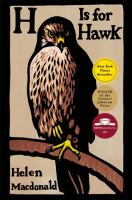 This is a book that defies classification, (we’ve shelved it in the 598’s with other birding books), but it is more memoir than non-fiction–an intertwined memoir of grief, love, falconry, and the natural world. What all of its parts have in common, however, are that they are beautifully, elegiacally written and absolutely captivating. I think the book is probably best summed up by this comment from the acknowledgements: “I would like to thank my father, who taught me how to love the moving world, and to my beloved hawk who taught me how to fly in it after he was gone.” -Samantha, Science and Technology Librarian
This is a book that defies classification, (we’ve shelved it in the 598’s with other birding books), but it is more memoir than non-fiction–an intertwined memoir of grief, love, falconry, and the natural world. What all of its parts have in common, however, are that they are beautifully, elegiacally written and absolutely captivating. I think the book is probably best summed up by this comment from the acknowledgements: “I would like to thank my father, who taught me how to love the moving world, and to my beloved hawk who taught me how to fly in it after he was gone.” -Samantha, Science and Technology Librarian
Hazel’s Pick
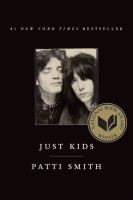 I happen to be a big fan of Patti Smith’s other ventures (music, poetry)—but you don’t have to be for Just Kids to work its magic. The protopunk icon’s memoir of ‘60s-‘70s New York City revolves largely around her relationship with longtime artistic and romantic partner, acclaimed photographer Robert Mapplethorpe. Smith is a generous storyteller whose writing is both elegantly reflective and unapologetically candid, and the result is a critical, yet forgiving, meditation on youth, art, and the boundless nature of love. If you missed Just Kids (and the slew of awards it claimed) in 2010, now is your chance to see what all the fuss is about before the next episode of Smith’s story, M Train, hits in October. -Hazel
I happen to be a big fan of Patti Smith’s other ventures (music, poetry)—but you don’t have to be for Just Kids to work its magic. The protopunk icon’s memoir of ‘60s-‘70s New York City revolves largely around her relationship with longtime artistic and romantic partner, acclaimed photographer Robert Mapplethorpe. Smith is a generous storyteller whose writing is both elegantly reflective and unapologetically candid, and the result is a critical, yet forgiving, meditation on youth, art, and the boundless nature of love. If you missed Just Kids (and the slew of awards it claimed) in 2010, now is your chance to see what all the fuss is about before the next episode of Smith’s story, M Train, hits in October. -Hazel
“Yet you could feel a vibration in the air, a sense of hastening. It had started with the moon, inaccessible poem that it was. Now men had walked upon it, rubber treads on a pearl of the gods. Perhaps it was an awareness of time passing, the last summer of the decade. Sometimes I just wanted to raise my hands and stop. But stop what? Maybe just growing up.” –Just Kids
Sonya’s Pick
Getting (More of) What You Want, by Margaret Neale and Thomas Lys
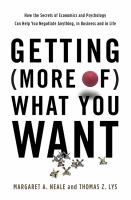 I have to admit I am a horrible negotiator. I often walk away from a deal feeling like I left something on the table. Getting (More of) What You Wantprovides useful tips to navigate the murky waters of negotiation. In this book, Margaret Neale and Thomas Lys draw on the latest advances in psychology and economics to provide new strategies for anyone shopping for a car, lobbying for a raise, or simply haggling over who takes out the trash. -Sonya
I have to admit I am a horrible negotiator. I often walk away from a deal feeling like I left something on the table. Getting (More of) What You Wantprovides useful tips to navigate the murky waters of negotiation. In this book, Margaret Neale and Thomas Lys draw on the latest advances in psychology and economics to provide new strategies for anyone shopping for a car, lobbying for a raise, or simply haggling over who takes out the trash. -Sonya
Gabrielle’s Pick
The Guynd: A Scottish Journal, by Belinda Rathbone
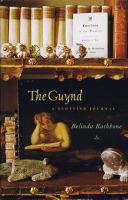 If you’re finding yourself overwhelmed by the list of things you have to do around your house — mow the lawn, repair the screen door, get the dishwasher fixed – try this book about an American woman who marries the laird of an ancient Scottish family home. Their list of house (or in this case, estate) chores might make yours seem manageable. Rathbone writes lightly and engagingly of troubles with tenants, struggles with overgrown gardens, and the challenges of the long, cold Scottish winters. -Gabrielle
If you’re finding yourself overwhelmed by the list of things you have to do around your house — mow the lawn, repair the screen door, get the dishwasher fixed – try this book about an American woman who marries the laird of an ancient Scottish family home. Their list of house (or in this case, estate) chores might make yours seem manageable. Rathbone writes lightly and engagingly of troubles with tenants, struggles with overgrown gardens, and the challenges of the long, cold Scottish winters. -Gabrielle
“Bar and I improvised an Angus fish chowder with the local smoked peppered mackerel and potatoes out of our own fields. With oatcakes and salad and Stilton cheese and plenty of wine we ate and drank after a long day’s work. After dark, around the dinner table with the shimmer of old silver and glass in the candlelight and the laughter of friends, I felt as far away and out of time as anyone could hope to be. We lingered, as people do here. There was no reason to hurry. Nothing happening here except us, nothing outside but the hoot of an owl or the flicker of a bat, while indoors we hovered on a classical cloud.” –The Guynd
Tom’s Pick
The Long Walk by Slavomir Rawicz
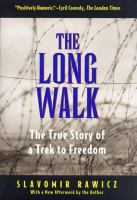 An old favorite of mine is The Long Walk by Slavomir Rawicz, originally published in 1956. It’s the story of seven POW’s from a 1939 Soviet labor camp in Eastern Siberia, who escaped on foot down the River Lena, around Lake Baikal, through Mongolia (including a traverse of the Gobi, north to south) through Central China, Tibet and Nepal to eastern India (now Bangladesh). An incredible tale of dogged, one-foot-in-front-of-the-other, gut-it-out bravery. Cyril Connolly of the London Times said it was “positively Homeric,” and I agree. -Tom, Reference librarian
An old favorite of mine is The Long Walk by Slavomir Rawicz, originally published in 1956. It’s the story of seven POW’s from a 1939 Soviet labor camp in Eastern Siberia, who escaped on foot down the River Lena, around Lake Baikal, through Mongolia (including a traverse of the Gobi, north to south) through Central China, Tibet and Nepal to eastern India (now Bangladesh). An incredible tale of dogged, one-foot-in-front-of-the-other, gut-it-out bravery. Cyril Connolly of the London Times said it was “positively Homeric,” and I agree. -Tom, Reference librarian
Harper’s Pick
Pilgrim at Tinker Creek, by Annie Dillard

My mother bequeathed her well-worn copy of Pilgrim to me when I was thirteen and in need of spiritual sustenance. I have read and reread it nearly every year since, stumbling to find the moments in nature when I too am a bell, ringing. -Harper
“When her doctor took her bandages off and led her into the garden, the girl who was no longer blind saw ‘the tree with the lights in it.’ It was for this tree I searched through the peach orchards of summer, in the forest of fall and down winter and spring for years. Then one day I was walking along Tinker Creek and thinking of nothing at all and I saw the tree with the lights in it. I saw the backyard cedar where the mourning doves roost changed and transfigured, each cell buzzing with flame. I stood on the grass with the lights in it, grass that was wholly fire, utterly focused and utterly dreamed. It was less like seeing than like being for the first time able to see, knocked breathless by a powerful glance. The flood of fire abated, but I’m still spending the power. Gradually the lights went out in the cedar, the colors died, the cells unflamed and disappeared. I was still ringing. I had been my whole life a bell and never knew it until at that moment I was lifted and struck.” –Pilgrim at Tinker Creek
Adult Fiction
Patti’s Pick
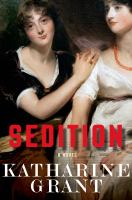 London, 1794. Four rich men devise a plan to marry off their daughters. They will collectively buy one of these newfangled musical instruments–a pianoforte–and have the girls give a recital for marriageable young men with titles. What these wealthy men don’t know is that the piano maker considers them philistines, that he would not sell them a piano were he not in desperate need of the money, and that he has contracted for them a French piano teacher–a refugee from the French Revolution–whom he has bribed to seduce the daughters. That is, if the daughters don’t seduce him first. -Patti
London, 1794. Four rich men devise a plan to marry off their daughters. They will collectively buy one of these newfangled musical instruments–a pianoforte–and have the girls give a recital for marriageable young men with titles. What these wealthy men don’t know is that the piano maker considers them philistines, that he would not sell them a piano were he not in desperate need of the money, and that he has contracted for them a French piano teacher–a refugee from the French Revolution–whom he has bribed to seduce the daughters. That is, if the daughters don’t seduce him first. -Patti
Excerpt:
Harriet could wait no longer. She took off a shoe and thrust it into Georgiana’s hand. “See, Georgiana! Straight from the foot of a noble Frenchie. Aren’t they fancy.”
Georgiana forced her attention onto the shoe. A small garden scene had been painted on the heel. “How do you know they came from someone noble?”
“It was picked up at the guillotine, silly. There’s lots of shoes like this to be had from France right now. Father gets them, though he tells Mother they were made in London. You know how she is about foreign things.” –Sedition
Meghan’s Pick
The Pharmacist’s Mate, by Amy Fusselman
 As a new mother, I am all too aware that joy is girded by sadness. All the future pain and loss my child will experience — the hypothetical as well as the inevitable — rushes up within me as I watch her sleep. But what if my experience were reversed, if new life was created in the shapeless, nonsensical aftermath of loss? I picked up Amy Fusselman’s 2001 novel “The Pharmacist’s Mate” because of the cover: a painting by Marcel Dzama of a woman playing guitar for a ghost. In the weeks following the death of her father, the narrator continues receiving endlessly frustrating, and endlessly comical, fertility treatments, trying to create life while she tries to understand where her father is now. Though it’s an inconclusive fact, she keeps noticing that music does in fact exist, although we cannot see or touch it. This slender, quick-reading novel is a reminder that joy and sadness are always present, though we can’t always see them both. -Meghan
As a new mother, I am all too aware that joy is girded by sadness. All the future pain and loss my child will experience — the hypothetical as well as the inevitable — rushes up within me as I watch her sleep. But what if my experience were reversed, if new life was created in the shapeless, nonsensical aftermath of loss? I picked up Amy Fusselman’s 2001 novel “The Pharmacist’s Mate” because of the cover: a painting by Marcel Dzama of a woman playing guitar for a ghost. In the weeks following the death of her father, the narrator continues receiving endlessly frustrating, and endlessly comical, fertility treatments, trying to create life while she tries to understand where her father is now. Though it’s an inconclusive fact, she keeps noticing that music does in fact exist, although we cannot see or touch it. This slender, quick-reading novel is a reminder that joy and sadness are always present, though we can’t always see them both. -Meghan
Lisa’s Pick
Strangler Vine, by M.J. Carter (audiobook). Read by Alex Wyndham.
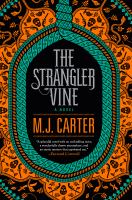 A fascinating mystery set in 19th century colonial India. This audiobook is a true adventure story, with highwaymen, spies, thugs, and agents of the British East India Company tromping from one end of India to the other. The book also contains a fascinating history of colonial rule and the Indian people. The reader, Alex Wyndham, is perfect, and dishes out the story in such a wonderful British accent that you’ll find yourself sitting in the driveway for just a few more minutes to get to the end of chapter.
A fascinating mystery set in 19th century colonial India. This audiobook is a true adventure story, with highwaymen, spies, thugs, and agents of the British East India Company tromping from one end of India to the other. The book also contains a fascinating history of colonial rule and the Indian people. The reader, Alex Wyndham, is perfect, and dishes out the story in such a wonderful British accent that you’ll find yourself sitting in the driveway for just a few more minutes to get to the end of chapter.
We’ve ordered the audiobook, and in the meantime, find it at PPL in print.
-Lisa, Outreach Manager
Elizabeth’s Pick(s)
The Neapolitan Novels, by Elena Ferrante. Translated by Ann Goldstein.
My Brilliant Friend, The Story of a New Name, Those Who Leave and Those Who Stay
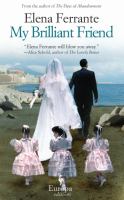
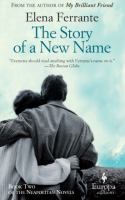
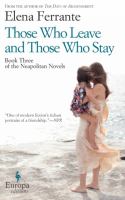
“Nowhere is it written that you can’t do it.”-My Brilliant Friend
Lesson learned: don’t judge books by their puzzlingly pastel, frilly, or soft-appearing covers.
What can you do with the life and the world you’re born into? Do you choose anything freely? Who is best to love? How do the choices you make change your life? How does friendship work over time? How do you stay true to yourself, or to others? How do you learn, over and over again? These questions rose- full of grit and ferocity and real feeling- again and again as I read through Elena Ferrante’s Neapolitan novels. Ferrante’s writing follows two friends, Lila and Elena, from the time of their childhood. The books and Lila and Elena’s lives are steeped in the Neapolitan neighborhood they grow up in, the people they grew up with, and all that grips the two women tightly: harshness, yearning, choice, constraint, education, family, sex, class, work, politics, children, and most of all, their own complicated friendship. What will become of them? Ferrante’s final installment of Lila and Elena’s captivating journey together (and apart), “The Story of the Lost Child,” comes out in September. -Elizabeth
Thanks for reading! For any questions or help locating materials, please contact us.
posted: , by Elizabethtags: Adults | Teens | Kids & Families | Seniors | Art & Culture

